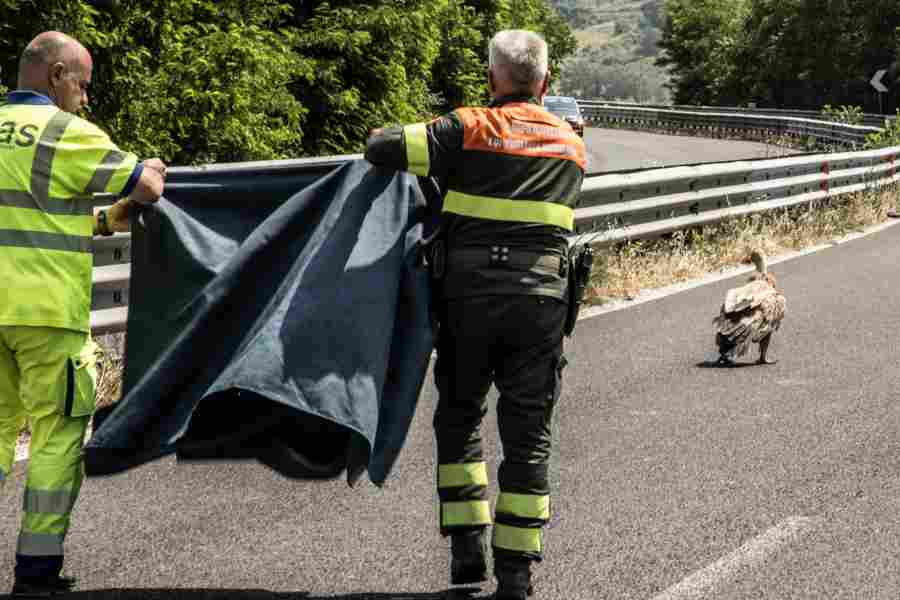
In early March, five Griffon Vultures were equipped with GPS transmitters in Messolonghi, Greece, to help set up an early warning system for wildlife poisoning in the area. The colony in Messolonghi is the largest Griffon Vulture colony in Mainland Greece and one of the most important wintering areas for the species in the Balkans.
Tracking vultures to tackle wildlife poisoning
Following the catastrophic mass poisoning incident at the Griffon Vulture colony in Messolonghi, Greece, in February 2020, the Fund for Wild Flora & Fauna (FWFF) took part in the tagging of five Griffon Vultures with GPS transmitters by providing advisory and logistical support to the Management Body of Messolonghi National Park in Greece. The FWFF provided three GPS transmitters under a project funded by the Whitley Fund for Nature, and two were provided within the VCF’s Balkan Anti-Poisoning Project Small Grants Programme, funded by the Mava Foundation. In total, five Griffon Vultures were tagged on 6 and 7 March 2020.
Griffon Vultures tagged and released

The ANIMA Rescue Centre successfully rehabilitated two of the birds tagged that were poisoned by the incident in February 2020. The other three Griffon Vultures were equipped with transmitters and returned to nature after being bred for several years in captivity at another rescue centre in Greece. The release of the vultures happened at a special ceremony near Messolonghi, attended by conservationists, locals and officials.
Early Warning System for wildlife poisoning
To ensure reliable monitoring of bird behaviour and rapid response to poisoning incidents, a minimum of five transmitters working at a time in one vulture colony are required.
The FWFF has gained considerable experience first in responding to the case of Kresna Gorge, Bulgaria in March 2017, and subsequent application in the cases in Agrafa, Greece in 2018 and in Vrachanski Balkan, Bulgaria in 2019. The revolutionary use of transmitters as a tool for intensive monitoring and in-time control of threats to wildlife such as poisons and poaching has been described in a manual developed within the Vultures Back To LIFE project.
Five out of the six major vulture regions in the Balkans are already covered by the Early Warning System, with the number of vulture tagged steadily increasing with the help of donors such as LIFE, WFN, us here at the VCF and others.
We hope that this case of Griffon Vulture poisoning in Messolonghi and the actions against it will lead to a change that will ensure the conservation of these increasingly vulnerable, and important birds.
Source: FWFF
The Balkan Anti-Poisoning Project Small Grants Programme
The Balkan Anti-Poisoning Project Small Grants Programme is the first time we at the Vulture Conservation Foundation have run a grant programme, and with this we aim to reinforce national capacities within relevant governmental authorities and conservation NGOs from six countries (Albania, Bosnia and Herzegovina, Croatia, Greece, North Macedonia and Serbia) of the Balkan Peninsula. This work will support those organisations to improve the skills and capabilities in the detection and mitigation of poisoning incidents through the implementation of previously developed National Roadmaps and Strategies. More specifically, through these small grants we endeavor to secure the implementation of priority anti-poisoning actions listed in the National Anti-Poisoning Road-maps/Strategies, strengthen the capacities of relevant national governmental institutions in combating the illegal use of poison baits, improve the enforcement of relevant legislation and attract other funding opportunities for implementation of large-scale anti-poisoning projects in the region. Through the support of the MAVA Foundation, we managed to dedicate a budget of €60.000 for these small grants.
Balkan Anti-Poisoning Project

The Balkan Anti-Poisoning Project is a cross-border initiative bringing together wildlife conservation organisations, governmental agencies and other stakeholder such as; hunting associations, farmers and scientists, in six Balkan countries to tackle illegal wildlife poisoning.
Funded by the Mava Foundation we aim to secure real and continued engagement of the relevant national governmental authorities in the Balkan region against illegal wildlife poisoning and increase their capacity to counteract it and working together to take positive steps to protect vultures.
The Balkan Anti-Poisoning Project is a partnership between us here at the Vulture Conservation Foundation and the Albanian Ornithological Society-AOS, Protection and Preservation of Natural Environment in Albania-PPNEA, Ornithological Society “Naše ptice”,Association BIOM, Hellenic Ornithological Society-HOS, Macedonian Ecological Society-MES and Društvo za zaštitu i proučavanje ptica Srbije.
The Balkan Anti-Poisoning Project also contributes directly into the implementation of the Vulture Multi-Species Action Plan by carrying out anti-poisoning actions in Albania, Bosnia and Herzegovina, Croatia, Greece, North Macedonia and Serbia, and is building on our work for the last decade in the Balkans through the Balkan Vulture Action Plan.

Vultures Back To LIFE

Led by the wildlife conservation charity Green Balkans, with activities also implemented by the Fund for Wild Flora and Fauna, and bringing together partners from Bulgaria, Spain and Germany, Vultures Back to LIFE aims to reintroduce the cinereous or Eurasian black vulture to Bulgaria. The team will transfer and release around 60 birds, some from captive-breeding, but mostly coming from wildlife rehabilitation centers in Extremadura (Spain) into the wild in Bulgaria as well as creating supplementary feeding stations and improving populations of wild herbivores, improving the nesting conditions and creating artificial nest sites and tackling some of the major threats to vultures in the country such as insulating electricity pylons and illegal use of poison in the nature.




